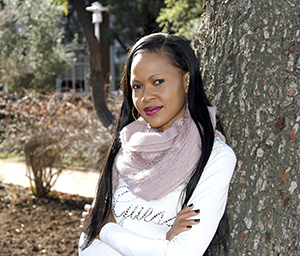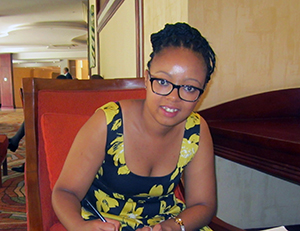Latest News Archive
Please select Category, Year, and then Month to display items
23 June 2023
|
Story Naledi Filita
|
Photo Supplied
 Naledi Filita is an nGAP Lecturer in the Department of Languages in Education.
Naledi Filita is an nGAP Lecturer in the Department of Languages in Education.
The University of the Free State (UFS) is celebrating Youth Month by showcasing the positive influence of the institution on career development. As part of this initiative, we are sharing the stories of UFS alumni who are now working at the university.
Naledi Filita, nGAP Lecturer in the Department of Languages in Education, shares her UFS journey:
Q: Year of graduation from the UFS:
A: 2016, 2018, and 2021.
Q: Qualification obtained from the UFS:
A: Bachelor of Education, Postgraduate Diploma in Education (Curriculum Studies), and Master of Education (Curriculum Studies).
Q: Date of joining the UFS as a staff member:
A: 2021.
Q: Initial job title and current job title:
A: Lecturer.
Q: How did the UFS prepare you for the professional world?
A: I started my career as a teacher in 2015 and was later appointed to my current job. The UFS has equipped me with the knowledge and skills that enabled me to be competent in my field in various contexts. My journey as a UFS student equipped me with crucial skills, such as critical thinking, communication, teamwork, and organisational skills.
Q: What are your thoughts on transitioning from a UFS alumnus to a staff member?
A: It has been a wonderful experience so far. I was once a student teacher at this university. Due to my experiences, being able to instil knowledge and skills in student teachers is something that I am passionate about. I am grateful for the developmental opportunities and support that I receive as a young researcher.
Trauma, Forgiveness, and Reconciliation Studies attracts global attention
2016-06-27

Lerato Machetela is on her way to
Ghent University in Belgium where
she will spend 10 months working
alongside experts in the field of
historical trauma.
Photo: Eugene Seegers
Research excellence is one of the major driving forces at the core of the University of the Free State (UFS). This striving for academic distinction has found embodiment within Trauma, Forgiveness, and Reconciliation (TFR) Studies. Headed by Research Fellow and Senior Research Professor Pumla Gobodo-Madikizela, the research unit is raking in achievements consistently.
Cornell University Distinguished African Scholar Award
Leading by example, Prof Gobodo-Madikizela received the prestigious 2016 Distinguished African Scholar Award from Cornell University recently. Being honoured with this award affirms an unusual depth of knowledge and experience in a field related to the recipient’s own work. Through this award, Prof Gobodo-Madikizela is now also affiliated with the Institute for African Development and the Psychology Department at Cornell University.
Ghent University fellowship in historical trauma
Another member of TFR has caught international attention. Lerato Machetela – a PhD student at the research unit – received an invitation from scholars at Ghent University in Belgium. Machetela will leave in September, where she will spend ten months in Ghent with experts in the field of historical trauma. She will be affiliated to their university’s Cultural Memory Studies Initiative and the Psychology Department. When Machetela submitted her PhD proposal on transgenerational transmisison of trauma among the youth in Jagersfontein to the UFS Psychology Department panel, “it was hailed as a unique project, and a first for the department,” Prof Gobodo-Madikizela says.

Naleli Morojele conducting the research
in Rwanda that has formed the basis of
her new book, Women Political Leaders
in Rwanda and South Africa: Narratives
of Triumph and Loss.
Book explores triumph and loss of female political leaders
TFR cultivates thriving authors actively, the latest being Naleli Morojele, who is pursuing a PhD in the field of Political Studies. Soon, Morojele will be launching her book, Women Political Leaders in Rwanda and South Africa: Narratives of Triumph and Loss. Through the stories of significant female Rwandan and South African leaders, the reader gains insight into these women’s early-life experiences, struggles, and successes. Perhaps even more pertinently, Morojele’s book also exposes the ways in which gender inequality still works to smother their roles as citizens and politicians.